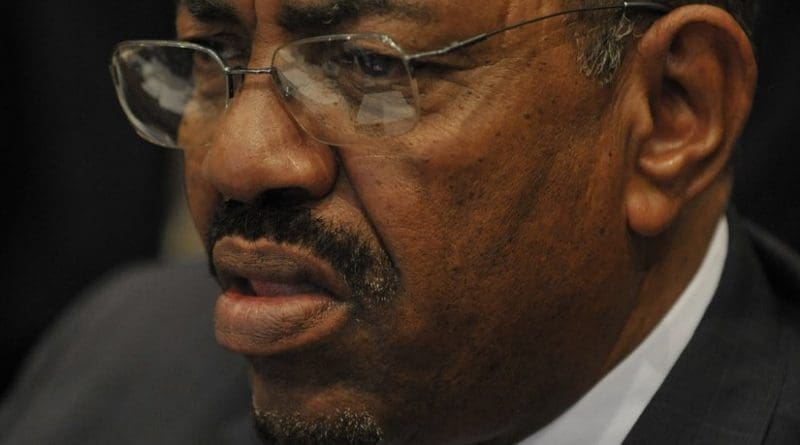Sudan To Hand Bashir, Other Officials Wanted For Darfur War Crimes, To ICC For Trial
By Arab News
Sudanese authorities are to hand former dictator Omar Bashir over to the International Criminal Court, where he faces charges of genocide, war crimes and crimes against humanity in Darfur.
The move follows talks in Khartoum on Wednesday between ICC chief prosecutor Karim Khan and Sudanese sovereign council leader Gen. Abdel Fattah Al-Burhan and Prime Minister Abdalla Hamdok.
“Sudan’s commitment to seek justice is not only to abide by its international commitments, but it comes out of a response to the people’s demands,” Hamdok said.
The UN says 300,000 people were killed and 2.5 million displaced in the Darfur conflict in western Sudan, which began in 2003. The ICC issued an arrest warrant for Bashir in 2009 for war crimes and crimes against humanity, and later added genocide to the charges.
Bashir, 77, who ruled Sudan with an iron fist for three decades, was ousted by the military and detained in April 2019 after four months of mass nationwide protests against his rule.
In December 2019 he was convicted of corruption, and is behind bars in the high-security Kober Prison in Khartoum. Since July 2020 Bashir has been on trial in Khartoum for the 1989 Islamist coup that brought him to power, and faces the death penalty if convicted.
Sudan has been led since August 2019 by a transitional civilian-military administration that has vowed to bring justice to victims of crimes committed under the former dictator. Human rights groups have long accused Bashir and his former aides of using a scorched earth policy, raping, killing, looting and burning villages.
The “cabinet decided to hand over wanted officials to the ICC,” Foreign Minister Mariam Al-Mahdi was quoted as saying by state news agency SUNA, without giving a time frame.
On Wednesday, Khan met the sovereign council’s leader, General Abdel Fattah Al-Burhan, and Mohamed Hamdan Daglo, its deputy chair. Daglo said Sudan “is prepared to cooperate with the ICC,” adding that justice was one of the pillars the revolution that deposed Bashir was based on, state news agency SUNA reported.
Prime Minister Abdalla Hamdok, who also met Khan, said Wednesday that “Sudan’s commitment to seek justice is not only to abide by its international commitments, but it comes out of a response to the people’s demands.”
The sovereign council, a joint military and civilian body overseeing Sudan’s transition toward democracy, said: “We will accomplish our mission in order to achieve the expectations of the international community, especially with regard to Security Council resolutions to achieve justice toward the heroes of Darfur, the victims and the living, who are hungry to achieve justice.”
Despite the move to hand him over to the court, Bashir may not be extradited to the Hague, the ICC’s headquarters, and could be tried in Sudan. Volker Perthes, UN special representative for Sudan, said the ICC could “help with the establishment of a Special Court for Darfur.”
The transitional authorities have previously said they would hand Bashir over, but one stumbling block was that Sudan was not party to the court’s founding Rome Statute.
But last week Sudan’s cabinet voted to ratify the Rome Statute, a crucial move seen as one step toward Bashir potentially facing trial.
ICC spokesperson Fadi El Abdallah did not comment on the announcement, saying Khan was “in Khartoum to discuss cooperation matters,” but that the prosecutor would hold a press conference on Thursday afternoon.
In Washington, State Department spokesman Ned Price praised Sudan’s decision to hand over Bashir and other former officials wanted by the ICC for crimes in Darfur, saying it would be a “major step for Sudan in the fight against decades of impunity.”
Price told reporters the US is looking forward to joint action by the cabinet and the sovereign council to finalize and execute the decision.
“We urge Sudan to continue to cooperate with the ICC by handing over those subject to arrest warrants and by cooperating on the provision of the requested evidence,” he added.
The US for years pressured nations not to welcome Bashir due to the 2009 arrest warrant over the brutal conflict in Darfur, which Washington had described as genocide.
In December, Washington removed Sudan from its list of state sponsors of terrorism, and later also vowed to clear the country’s arrears with the World Bank.
Bashir is behind bars alongside two other former top officials facing ICC war crimes charges — ex-defense minister Abdel Rahim Mohamed Hussein and Ahmed Haroun, a former governor of South Kordofan.
The ICC issued an arrest warrant for Bashir in 2009 for war crimes and crimes against humanity in Darfur, later adding genocide to the charges.
The Darfur war broke out in 2003 when non-Arab rebels took up arms complaining of systematic discrimination by Bashir’s Arab-dominated government.
Khartoum responded by unleashing the notorious Janjaweed militia, recruited from among the region’s nomadic peoples.
Human rights groups have long accused Bashir and his former aides of using a scorched earth policy, raping, killing, looting and burning villages.
Khartoum signed a peace deal last October with key Darfuri rebel groups, with some of their leaders taking top jobs in government, although violence continues to dog the region.
But after years of conflict, the arid and impoverished region remains awash with automatic weapons and clashes still erupt, often over land and access to water.
Last year, alleged senior Janjaweed militia leader Ali Muhammad Ali Abd Al-Rahman, also known by the nom de guerre Ali Kushayb, surrendered to the court, where he faces charges of murder, rape and torture.

